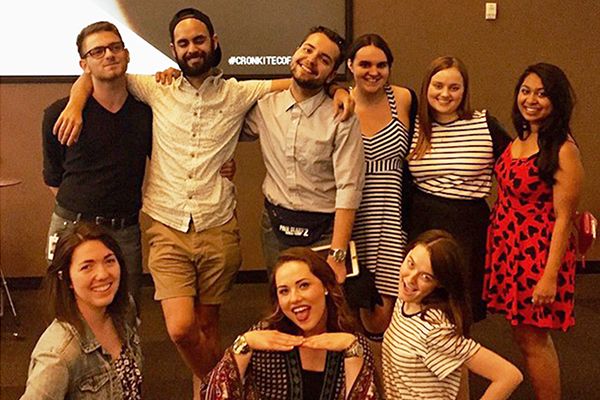By Liz Massey, August 2015 Issue.
Today’s college students will enter a professional environment that is unprecedented in terms of protection and inclusion for LGBT employees.
Echo caught up with two Arizona State University students and asked them how their involvement in student/professional groups
was impacting their vocational aspirations.
Danika Worthington
Worthington is the president of the National Lesbian and Gay Journalist Association - ASU Chapter (NLGJA-ASU), the first student chapter in U.S.
According to the NLGJA-ASU Facebook page (facebook.com/NLGJAASUChapter), NLGJA is “an organization of journalists, media professionals, educators and students working from within the news industry to foster fair and accurate coverage of LGBT issues. NLGJA opposes all forms of workplace bias and provides professional development to its members, with this page specific to the ASU chapter.”
Echo: Tell us about your organization and how it prepares LGBT students for a successful career.
Worthington: We’re a small group, and all of us are journalism majors. We talk about LGBT issues in the media and how they could be better addressed. We discuss how to come out at work, how to deal with homophobic co-workers, and why it is OK as an LGBT reporter or producer to cover LGBT topics.
Echo: Do you think it’s important for LGBT students to network with gay professionals? What can they learn from that experience?
Worthington: It’s important for several reasons, one of which being that it can lead to employment. Our chapter had mixers with the main NLGJA chapter in Arizona in the last year or two, and I know that one of our chapter leaders at the time landed a professional job from that. Another reason that talking to a current gay professional is important is because if someone has an issue, such as how their orientation or identity will be perceived, the perspective of someone who is already out in the field is going to have more weight (for a student), because they’ve been through this before.
Echo: What tips would you have for a student or new graduate in your profession related to being out at their first professional level job?
Worthington: A lot of advice in this area depends on the person and their situation, but you should be able to be comfortable with who you are at work. Being closeted is a miserable experience. Don’t shy away from water-cooler conversation. If you respect them, they’ll respect you. And be honest with your readers. Don’t be afraid to be out and to talk about the LGBT aspects of your life, particularly as you share your work on social media channels like Twitter.
Alejandro Ramirez
Ramirez is the founder of ASU’s Chapter of Out in Science, Technology, Engineering and Mathematics (oSTEM), a national society dedicated to educating and fostering leadership for LGBTQA communities in the STEM fields.
According to oSTEM at ASU’s Facebook page (facebook.com/asuostem), it’s mission is “To educate, empower, and engage a diverse community. To identify, address and advocate for the needs of LGBTQA students in the STEM fields … through mentorship connections, networking opportunities, strategic collaborations and professional/leadership development.”
Echo: Tell us about your organization and how it prepares LGBT students for a successful career.
Ramirez: Out in Science, Technology, Engineering, and Mathematics at Arizona State University (oSTEM at ASU) helps prepare LGBT students for a successful career in the STEM fields by hosting a variety of workshops and networking events in partnership with LGBT-friendly employers in the valley. During the past year, we have brought over the LGBT Alliance group from Arizona Public Service (APS) to talk to us what it is like to be out at APS specifically, as well as provide us with a resume/interviewing workshop.
Echo: Do you think it’s important for LGBT students to network with gay professionals? What can they learn from that experience?
Ramirez: I believe it’s crucial for LGBT students to network with other LGBT professionals for several reasons. Networking with folks who are already in the field and out will help provide students with invaluable information about what the social climate is like in that particular company. It is especially important as STEM students to know they can openly be themselves without being shut out or valued less, since STEM fields, especially those related to engineering, tend to be fairly conservative.
Echo: What tips do you have for students or new grads in your field related to being out at their first professional level job?
Ramirez: I would let them know that they should be able to feel comfortable and be themselves in their work environment. Try and find out if the company for which you work has an LGBT alliance that you can join. If they do not, find out if and how you can potentially start one. If you’re not comfortable being out at your new place of employment, it’s completely understandable; however, it is important you feel comfortable and safe being yourself around your coworkers, supervisors, etc.
